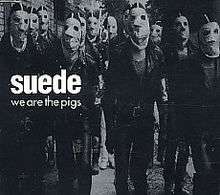We Are the Pigs
"We Are the Pigs" is the first single from the album Dog Man Star by British band, Suede, released on 12 September 1994, on Nude Records.
| "We Are the Pigs" | ||||
|---|---|---|---|---|
 | ||||
| Single by Suede | ||||
| from the album Dog Man Star | ||||
| B-side | "Killing of a Flash Boy" | |||
| Released | 12 September 1994 | |||
| Recorded | 1994 | |||
| Studio | Master Rock Studios, London, England | |||
| Genre | Britpop | |||
| Length |
| |||
| Label | Nude | |||
| Songwriter(s) | Brett Anderson, Bernard Butler | |||
| Producer(s) | Ed Buller | |||
| Suede singles chronology | ||||
| ||||
Background
The single heralded the darker tone that the band had taken for Dog Man Star, that contrasted heavily with their debut. The challenging sound on the single was not characteristic of the popular Britpop bands of the time. The departure of guitarist Bernard Butler, ahead of its release, overshadowed the single somewhat. That event, along with the song's music video receiving little airplay, contributed to its relatively poor charting, although still managing a No. 18 peak.[1]
Singer and co-writer Brett Anderson has said he wrote it while he was living in Highgate. It is a song about revolution and the juxtaposition between the middle class lives of Highgate and the council estates of the not too far away Archway. He said: "[It's] a warning to the middle classes that everyone they're keeping under their feet is going to end up crushing their skulls. That was the idea behind it. It's supposed to be quite a violent thing."[2]
The cover art for the single features a still from the cult film Freak Orlando.
Music video
The video for We Are The Pigs, directed by David and Raphael Vital-Durand, features a grim, Nineteen Eighty-Four-like setting. It was initially banned by some TV stations including MTV for being too violent. The video features burning cars, cross burnings, and masked gangs roaming the streets, committing violent acts. Also notable is the video features the first official public appearance of new guitarist Richard Oakes. The video for the b-side, Killing Of A Flash Boy, was shot on Hackneys Nightingale Estate.
Reception and legacy
The single was very well-received in the British press. David Sinclair of The Times wrote: "Propelled by one of Bernard Butler's finest riff chord sequences and fuelled by the nightmare visions of Brett Anderson's lyric, the song romps home with a glorious chorus that combines old-fashioned sing-a-long appeal with an intriguingly sinister edge."[3] Caroline Sullivan's review in The Guardian was printed the day before the band announced Oakes as their new guitarist. In it she predicted it would be the band's swansong. However, she was very favourable, saying: "It's a typically melodramatic affair, Butler's squawking playing counterpointed by Brett Anderson's breastbeating emoting. One of their best."[4]
Pitchfork placed "We Are the Pigs" at No. 169 on their list of the Top 200 Tracks of the 1990s.[5] The b-side "Killing of a Flash Boy" also became a staple of Suede's live set list and became one of their most popular songs. It is also available on the B-sides album Sci-Fi Lullabies. In 2014, NME ranked the song at No. 364 on its list of the 500 greatest songs of all time.[6]
Track listings
All songs written by Brett Anderson and Bernard Butler.
7" vinyl, cassette
- "We Are the Pigs"
- "Killing of a Flashboy"
12" vinyl, CD
- "We Are the Pigs"
- "Killing of a Flash Boy"
- "Whipsnade"
References
- "Artist Chart History: Suede". Official Charts Company. Retrieved 15 June 2013.
- Cavanagh, David (October 1994). "3 Unlimited". Select (52): 89.
- Sinclair, David (10 September 1994). "Pop Singles; Recordings". The Times.
- Sullivan, Caroline (16 September 1994). "Pop". The Guardian.
- Tangari, Joe. "The Top 200 Tracks of the 1990s: 200-151". Pitchfork. Retrieved 4 April 2019.
- Barker, Emily (31 January 2014). "The 500 Greatest Songs Of All Time – 400-301". NME. Retrieved 20 December 2016.